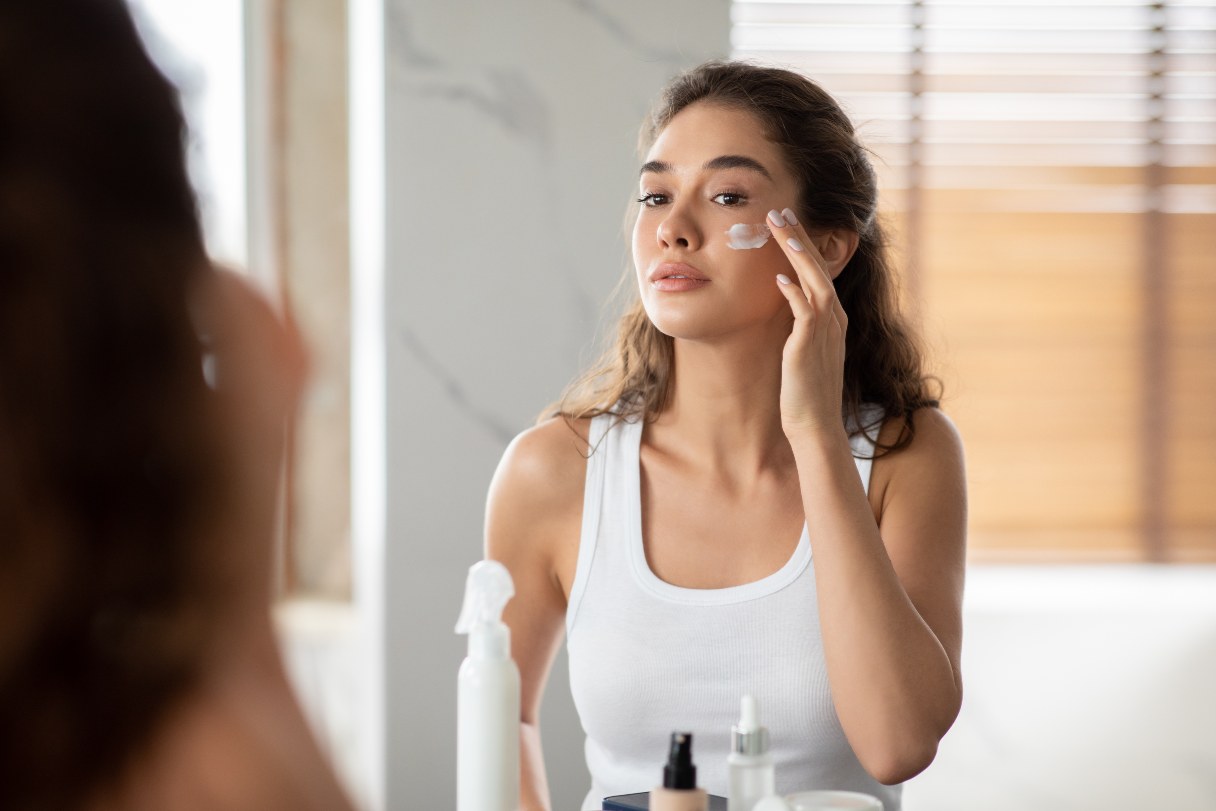The medical term for dry skin is xerosis, and there are several reasons you might experience it. Different seasons and even genetics can play a part in causing dry skin, but some daily habits can also directly impact it.
Luckily, simple changes can help reduce dryness. Let's look at 10 of the common causes of dry skin and what you can do about it.
1. Genetics
Do other family members have eczema or psoriasis? You're more likely to have these dry skin problems, too.1 Your genes determine many factors about your skin, including its moisture retention. If you have black, fair or brown skin, you may experience dry skin more often than someone who has medium skin.2
Treatment options
Book an appointment with a dermatologist for a clinical evaluation. Depending on the severity of your dry skin, your healthcare professional might suggest a prescription medication to help relieve it.3
Applying moisturizer as soon as you get out of the shower may also help your dry skin. Use gentle, fragrance-free products when cleansing and applying moisturizer to lock in hydration from the shower or bath without unnecessary chemicals that can irritate sensitive skin.3
2. Age
Skin tends to become drier as you age, due to both chronological skin aging (the natural process of losing oils and elasticity) and photoaging (from UV radiation). As you get older, it's harder for the layers of skin to hold in moisture and function as well as they did when you were younger, and the result is skin that can look drier, paler and potentially more wrinkled.4
Treatment options
A hydrated or moisturized face often gives a younger-looking appearance over someone whose skin is dehydrated. Apply broad-spectrum sunscreen daily to prevent photoaging skin damage.5 Follow these sun protection tips to help prevent skin cancer.
3. Vitamin Deficiencies
Vitamins play an important role in keeping your skin healthy. Specific mineral and vitamin deficiencies can cause skin to appear dry and dull.6 A diet lacking in vitamin D, vitamin A, iron, niacin or zinc, for example, could cause your skin to look and feel dry.2
Treatment options
Talk to your physician about exploring potential vitamin deficiencies. You might want to enlist the help of a registered dietitian who can help you build your perfect healthy skin diet and ensure you're getting enough daily nutrients.
One study found that adding vitamin D supplementation to the diets of adults and children who had atopic dermatitis — which results in eczema lesions and itching — significantly reduced the severity of the symptoms.7
4. Prescription Medicine
Medications can impact your skin health from the inside out. If you’ve been prescribed statins or diuretics, for example, you’re likely to lose more water than someone who isn’t on these medications.2 Other medications can impact how the body absorbs certain vitamins, too.6
Treatment options
Talk to your medical care team about how much more water you should be drinking while on these medications. Ask if there are alternative medications you can take and their professional recommendations for handling these side effects that are causing dry skin.
5. Bathing Habits
Love a long, hot bath or a scorching shower? These are a common cause of dry skin all over your body because the hot water can suck the natural oils from your skin.3 You're more likely to experience dry skin after a hot shower if you're someone who has skin health concerns, like psoriasis.8
Treatment options
Use warm water instead of hot water, and limit showers to five minutes and baths to 10 minutes or less daily. After your shower or bath, gently blot your skin with a towel to dry it rather than rubbing it, which can exacerbate dry skin symptoms.3
6. Exposure to Cold, Dry Weather
When the thick, wet humidity leaves the air along with the warmer temps, you’re left with dry, cold air. The cold air can zap the moisture out of your skin, especially if it’s windy out while you’re braving frigid temps.2
Treatment options
Wearing gloves and covering up your face — particularly the mouth and nose — can help reduce the harsh wind's effect on the moisture of your skin. You'll also want to wear a moisturizing lip balm and try to avoid licking your lips.3
7. Smoking
Cigarette smoking is a common cause of dry skin — its harmful chemicals can lead to premature skin aging.2 It can also cause trans-epidermal water loss in the skin, also known as dehydrated skin.9
Treatment options
If you need one more reason to quit smoking, skin that holds hydration better and looks younger could be the push you need.
8. Exposure to Heating Sources
Many of us experience dry skin in the winter months when there’s less humidity in the air. At the same time, we’re also likely to be exposed to dry heat through our home's heating systems, portable heaters or even fireplace heat.1
Treatment options
If possible, avoid sitting too close to the roaring fire or heater.3 Run a cool mist humidifier in the room if you have a heating source on blast during cold nights.10
9. Health Conditions
People with diabetes, kidney disease or thyroid disease are more likely to notice dry skin than someone who doesn’t have these medical issues.2 Research shows that dry skin can be linked to how well your kidneys function. People with kidney disease or diabetes, which can affect how the kidneys work, are more likely to have dry skin.11
Treatment options
Talk to your healthcare team about the side effects of your medications and how much water you should drink for your specific health condition. Make a habit of carrying nourishing hand lotion and lip treatment creams to help combat dry skin.
10. Dehydration
You might be less motivated to chug water all day long when the weather is cooler — particularly if it’s cold water. But dull, dry and sometimes scratchy skin can be a sign that you’re dehydrated.1
Treatment options
Increase your water intake and track it. If you struggle to drink a lot of water in the winter months, sip on decaffeinated hot teas and eat vegetables and fruits that are hydrating.12
More Tips to Prevent Dry Skin
While you can talk to a doctor about dry skin treatment, you should also examine your daily habits and practices to help prevent dry skin. Here are common culprits that could be contributing to dry and itchy skin:3
Use gentle, hydrating, fragrance-free cleansers that moisturize while they clean. Skip the scrubs and deodorizing soaps if you have dry skin.
Hydrate skin with ointments and creams after showers and baths, and throughout the day as needed.
Wear protective lip ointments with SPF and try to avoid licking your lips, which can worsen dry, chapped lips.
Moisturize hands often, especially if you wash them frequently.
Read laundry detergent labels. For someone with eczema or psoriasis, certain harsh cleansers can further irritate the skin. Search for laundry detergent that’s labeled hypoallergenic.
Evaluate your diet. Find places to add in more produce — particularly rich greens — for iron, vitamins and minerals. Consider keeping a daily diary of what you’re eating if you think your diet might be causing issues with skin health. Talk to your general practitioner to make sure you’re taking the best multivitamin for your health and see if they recommend a supplement like vitamin D.
Treating dry skin can help prevent it from getting worse. If you think your dry skin is severe or you’re experiencing issues that could be eczema or another skin condition, it’s a good idea to make an appointment with your doctor to talk about potential treatments.
CareCredit Credit Card Financing for Dermatology
The CareCredit credit card makes it easy to pay for dermatology visits, over-the-counter treatments and prescription medications at locations within the CareCredit network.* Start enhancing your skin today and find a dermatologist near you that accepts CareCredit. Continue your wellness journey by downloading the CareCredit Mobile App to manage your account, find a provider on the go and easily access the Well U blog for more great articles, podcasts and videos.
In addition to dermatology, you can also use your CareCredit credit card for other cosmetic procedures, dentistry, pet care, vision, hearing, health systems, pharmacy purchases, spa treatments and so much more within the CareCredit network. How will you invest in your health and wellness next?
Author Bio
Diana Kelly Levey is a freelance journalist, content marketing writer and author with more than 15 years of experience covering health and wellness.








